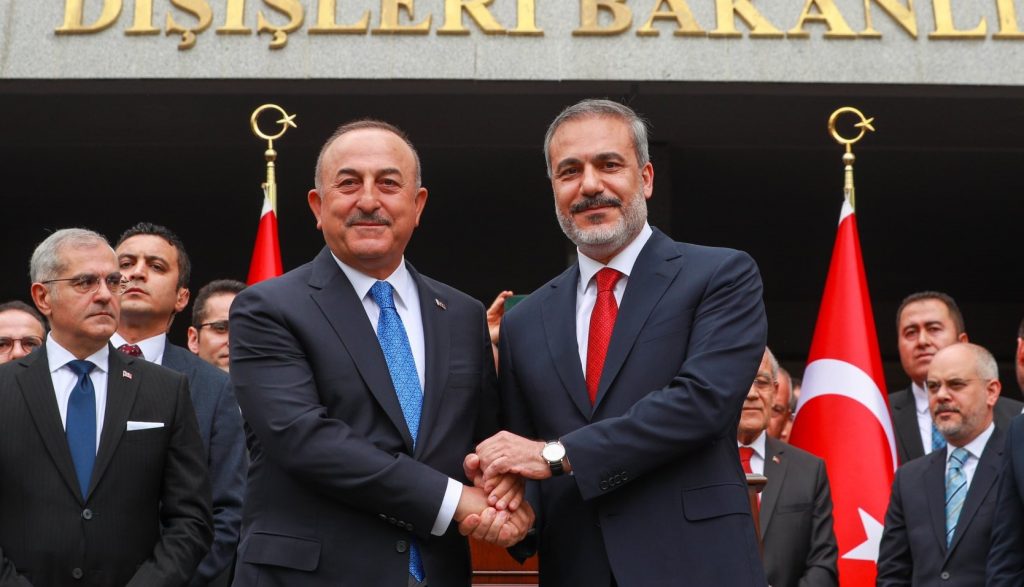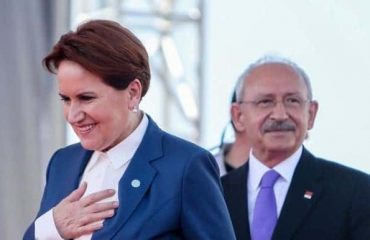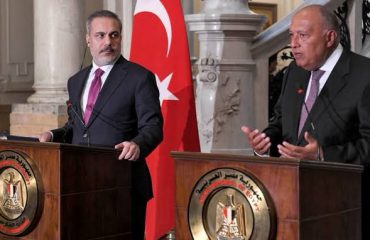

The former intelligence chief Hakan Fidan is now the foreign minister; a move that could usher in an era in which foreign policy and intelligence policy will be conducted together. The previous minister Mevlüt Çavuşoğlu is seen handing over his post to Fidan on June 5. (Photo: Twitter/Çavuşoğlu)
On June 5, Hakan Fidan took over the Ministry of Foreign Affairs from Mevlüt Çavuşoğlu, his classmate from Bilkent University. After leading the National Intelligence Organization (MIT) for 13 years, Fidan took the helm of Turkish foreign policy, something he has been involved in for the last 20 years.
The worlds of intelligence and diplomacy are often intertwined. It is well known that Richard Moore became the head of the British foreign intelligence service MI6 – of which he had been a part since his youth – after serving as the British Ambassador to Ankara, while the French secret service DGSE was headed by former French Ambassador Bernard Emié. (Fidan worked with both of them as ambassadors and spy chiefs.)
The head of the CIA, the American intelligence service, was George Bush, who later elected as the President of the United States. There is also the example of the appointment of Mike Pompeo as head of the CIA and then as Secretary of State under Donald Trump. However, Pompeo had no previous intelligence background.
Intelligence, operations, diplomacy
Fidan has both an intelligence and operational background.
I remember a conversation we had in his office when he was the Deputy Undersecretary to the Prime Minister. He would occasionally excuse himself from the conversation with courtesy to take a phone call to run a logistics operation in one of the neighboring countries.
As much as the Foreign Ministry, Fidan’s behind-the-scenes operations to get the votes of some countries with his man-to-man marking strategy played a role in Türkiye tp became a member of the UN Security Council in 2009-2010. At the time, he was representing Türkiye at the International Atomic Energy Agency (IAEA) while working as a “sherpa”, or pre-diplomacy emissary, in the nuclear talks with Iran.
Because of this function, Israeli intelligence started a rumor about him as “Iran’s man”. But as Soli Özel told Cansu Çamlıbel on T24, “Then he became the ‘most trusted man’ of the Israelis”.
Even before he became the head of MIT, he took part in secret talks with the PKK in Oslo, the capital of Norway, in his capacity as Deputy Undersecretary. In 2010, when Emre Taner retired, Erdoğan appointed him Undersecretary of MIT.
The youngest and scholar spy chief
At the age of 42, Fidan became the youngest state official to head Turkish intelligence.
Mehmet Ali Bayar, a politician with a diplomatic background, has a point about the lack of rational analysis in Türkiye that I agree with; the fallacy of evaluating events and people based on their past rather than their present. When Fidan became the Undersecretary of the MİT, those with this misconception minimized the fact that he started his government service as a sergeant in the military.
Fidan, on the other hand, had developed himself academically during his work in NATO intelligence and after his resignation in 2001. He graduated in Management and Political Science from the University of Maryland in the US, and while working as a political and trade counsellor at the Australian Embassy in Ankara, he started his master’s degree at Bilkent University on “The Place of Intelligence in Foreign Policy”.
After the AKP came to power in 2002, he was appointed as the head of TIKA in 2003 and started his doctoral studies at Bilkent University, which he completed in 2006. His topic was “Diplomacy in the Information Age: The Use of Information Technologies in Verifying Treaties”. He made a comparative study of intelligence systems in the US, the UK and Türkiye.
As I have covered in more detail in The Book of Spies, Fidan was the first “chief” of the Turkish intelligence who was an academic scholar and aspired for this job from this job coming to that place by studying intelligence and diplomacy.
PKK, Syria and the Fethullahists
At first glance, Fidan’s résumé looked like an artificial project for the job, but his perseverance needs no denial.
The first task Erdoğan gave him as “head of intelligence” was to revive the dialogue with the PKK after the failed Oslo process. This time, no foreign countries were to be involved and the process was to be “local and national”.
Meanwhile, the Syrian civil war broke out in 2011 and Erdoğan – initially together with the US, Saudi Arabia and Qatar – decided to support radical Islamist organizations that were rising up to overthrow Bashar al-Assad, whom he had called his “brother”.
The dialogue with PKK has disturbed some circles both within the country and abroad. The extend of this disturbance came to surface in February 2012 when the self-claimed cleric Fethullah Gülen’s organization infiltrated within the judiciary wanted to interrogate Fidan on suspicion of collaboration with the PKK. Until then the Gülen Organization had been intertwined with AKP rule, which was evinced in Ergenekon and Balyoz trials. The AKP and the Gülenists began to part ways with the “Fidan affair.”
This was followed in January 2014 by a gendarmerie operation to expose the material sent by MİT in trucks to armed groups in Syria.
The biggest espionage case in Turkey
But the real bombshell exploded in March 2014. On March 26, a few days before local elections, audio recordings of a secret Syria meeting between Fidan, Undersecretary of Foreign Affairs Feridun Sinirlioğlu and Chief of General Staff Yaşar Güler, held in Foreign Minister Ahmet Davutoğlu’s office on March 13, were released on YouTube.
In the recordings, a voice purportedly belonging to Fidan was heard saying that if military action was needed to move the tomb of Suleyman Shah in Syria, he could “send four men to Syria and fire eight missiles”.
In the days following the July 15, 2016 military coup, it was revealed that the recording was taken by General Güler’s chief of staff with a device placed in his briefcase that he brought to the meeting. It was reported that the lieutenant colonel had been killed while clashing with the soldiers in front of the General Staff on the night of July 15, and the file – with its shadowy details – was closed.
Davutoğlu who has become the successor of Erdoğan in Prime Ministry seat in order to prevent former President Abdullah Gül’s return to the AKP Fidan an MP before the June 2015 elections. In response, Fidan resigned from MİT, but Erdoğan strongly opposed the departure of Fidan, whom he called “my secret cube” and “my black box”, and demanded that he return to his job, which Fidan complied with.
Erdoğan and Davutoğlu’s paths began to diverge with the Fidan incident.
Now he is in that room, but not alone
Fidan now works in the room that was the scene of the biggest – known – espionage case in Türkiye in 2014.
Fidan will be the one that implement what Erdoğan said in his victory speech: the embodiment of Ataturk’s principle of ‘Peace at Home, Peace in the World’ by “expanding the sphere of influence of entrepreneurial and humanitarian diplomacy, not by turning inward and watching events from the stands”.
Therefore, under Fidan, we may witness Turkish foreign policy being managed by the same hand as operational intelligence policy for the first time in its history. In the same T24 interview, Soli Özel, whose foreign policy analyses I care about, made the important observation that “The impression I get abroad is that Fidan is seen as someone whose word can be trusted, who is serious and who takes professionalism seriously”. His international role in solving the case of Jamal Khashoggi, who was murdered in the Saudi Consulate General in Istanbul in October 2018, played a role in this. I say this independently of President Erdoğan’s maneuver of handing over the Khashoggi case to Riyadh in 2022 in order to mend relations.
Fidan will not be alone in implementing this policy. Erdoğan’s chief advisor on foreign and security policy – and spokesperson – Ibrahim Kalın, who replaced Fidan as head of the National Intelligence Organization (MIT) on June 5, is also a state official who has been practicing the intertwined model of intelligence, security and diplomacy for years.
Just as Erdoğan appointed Mehmet Şimşek as the Minister of Treasury and Finance in his cabinet and Cevdet Yılmaz, another economist, as the Vice President, he seems to have entrusted two of his trusted staff together to carry out this new foreign policy approach. And the same General Yaşar Güler from the wired room of 2014 is now a National Security Minister.
This approach reflects both the need to encourage cooperation and the need for mutual oversight.


